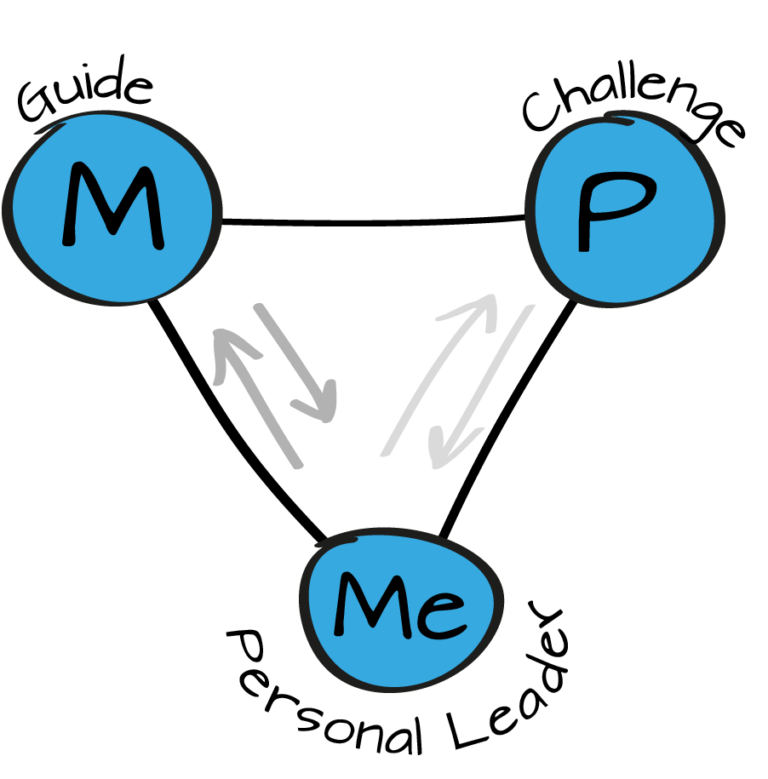
Transactional Analysis as a Leader Tool
Manager – organiser – leader. How does a manager take up the role of a leader? What exactly does a leader do? To what extent should a leader care about their colleagues? Let’s take a view from one possible perspective.
Disclaimer: when we talk about managers, we also mean organisers, teachers, trainers or coaches.
In the 1960s Eric Berne came up with several revolutionary concepts that influenced today’s psychology and the general way we work with people. One of his most famous books is “Games People Play”.
What is it all about?
According to Berne, the basic unit of people’s interaction (social contact) is a so-called transaction. If there are two or more people in the same room, sooner or later one of them will give a signal by which he/she acknowledges the existence of the others. If others react to that impulse, we can call it a TRANSACTION. Should this transaction bring us any benefit (or pleasure), we call it a GAME. Every game has its players who are playing their ROLES. These roles are chosen consciously, or – in most cases – unconsciously, based on their EGO STATE. And this is where things get interesting and complicated at the same time.
The 3 Ego States
We perceive the states of our Ego as a complex phenomenon of thinking, feeling and behaving. The first state evolved within us already in early childhood, this is what Berne calls “the Child”. When we get into this state as adults, we act as our childhood self would. This ego state has two polarities: the playful/submissive child and the stubborn/defiant child.
If our actions (thinking, feeling and behaving) are in line with the people who raised us, we are reaching the ego state of “the Parent”. As a Parent we are shifting between the critical/lecturing and the caretaking parent.
When we are able to rationally evaluate the situation in the given moment, and observe the emotions of the Child and the Parent, we are getting into the state of “the Adult”. As we are shifting between the ego states according to our current needs, we can take up several different roles in a conversation in a matter of seconds.
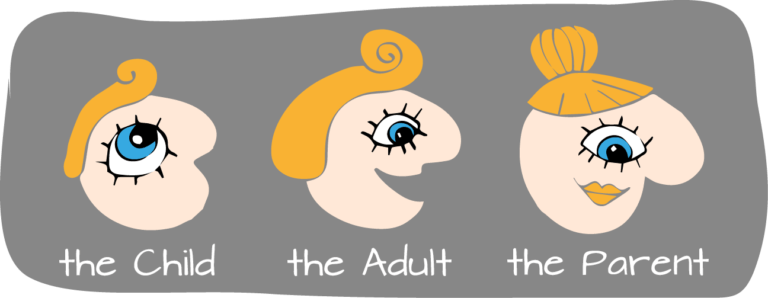
How does this game look like?
I used to spend a lot of time with my grandparents as a child. They lived in a big (that time even modern) flat with a lot of doors which had crystal glass filling. Behind one of those doors an old sewing machine was hidden. I was extremely fascinated by its mechanism – especially by the foot pedal and the wheel. Even today it makes me smile when I see an old Singer used as a coffee table in a bar.
One day, as I was exploring this machine behind the door at grandma’s, I accidentally smashed the door and the glass in it got broken. This was followed by the sound of breaking and falling glass. This signal made my grandma check what happened. After a quick visual revision of my health status – I didn’t have a scratch – she asked:
Grandma: “Who did this?”
I – still a little shocked: “A dwarf.”
Grandma put her hands on her hips and raised her eyebrows: “You know that you shouldn’t lie.”
My grandma’s question might look like a question of an “Adult” looking for factual information. On a psychological level, however, it prompted a challenge to lie – and I accepted it. It was then followed by a lesson on good behaviour from my grandma’s “Parent”. Of course, my grandma didn’t plan to catch me “at the crime scene”. It was her ego state giving me a lesson – just as she used to get it from her parents. (This memory came back to me after reading a similar example in the book Games People Play.)
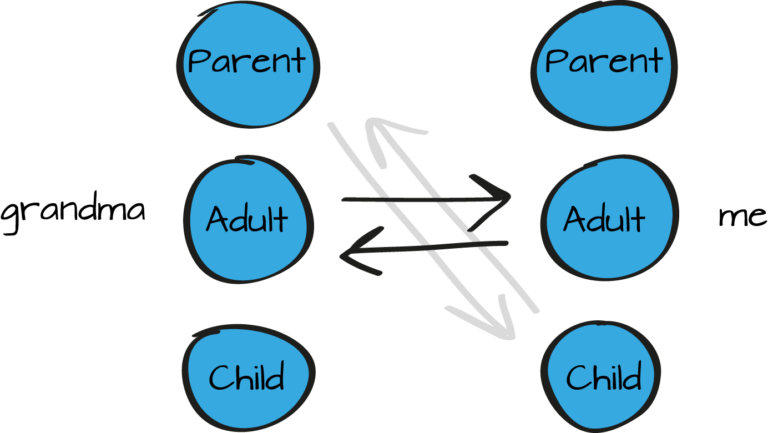
The question that emerges from the story is whether I needed to be taught a lesson or it was grandma’s “Parent” that needed to take care of me (quick visual control of any injuries) and reprimand me afterwards? In both cases, we both played our roles in the game.
Drama Triangle in Games
In connection with Berne’s work we should also take a look at the Drama Triangle theory by Karpman. According to this, every drama needs a “Victim” and every Victim has their “Perpetrator” and/or “Saviour”. Combining the two approaches, we can conclude that every Child has/looks for their Parent and vice versa.
Surrounded by the broken glass from the door, I was a Victim who had his Saviour (grandma), who shifted into the role of the Perpetrator. Together we played all three roles of the Drama Triangle and we both gained something from it. Additionally, I learned how to become a skilled player in the role of the Victim. After all, we learn how to behave in these games as early as in childhood.
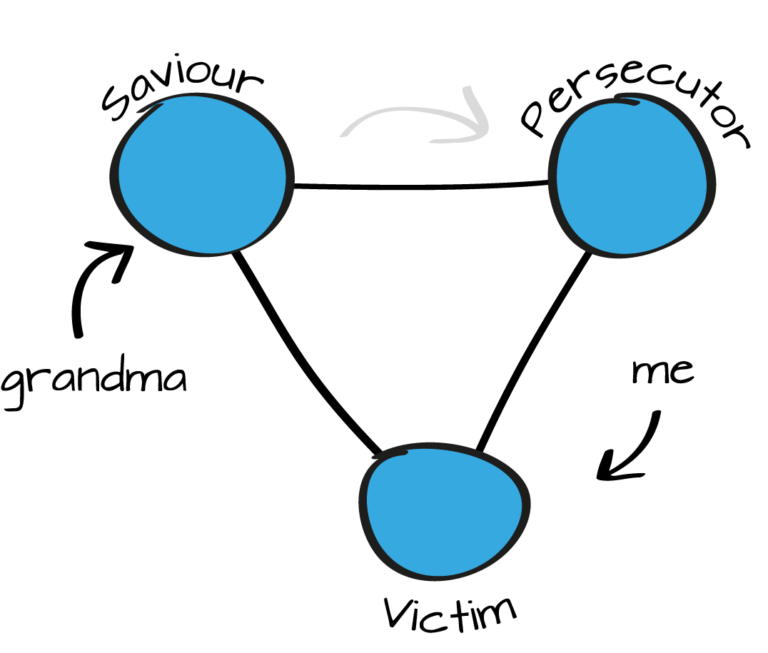
Now let’s see how all this looks like at our workplace.
Employee A: “That new colleague C doesn’t follow our deadlines and doesn’t answer my emails.”
Manager B: “Yeah, that sucks. Colleague C is very irresponsible.”
On the visible social level this is a communication between two Adults – an exchange of factual information and an agreement with the status quo. But let’s look deeper into the psychological level:
Employee A is having a hard time working together with the new Colleague C. He comes to Manager B and complains – communicates from as a Child / Victim. Manager B shows regret and identifies the Persecutor in the Drama Triangle. Thus, he communicates as the Parent / Rescuer. The gain (or pleasure) for Employee A is the feeling of reassurement that he is a good, efficient employee, whereas Manager B can maintain his position as a manager who takes care of his employees or reprimands them. The problem is that Manager B did not help Employee A in the long run. He simply supported the game in this triangle, so they can go play it tomorrow as well.
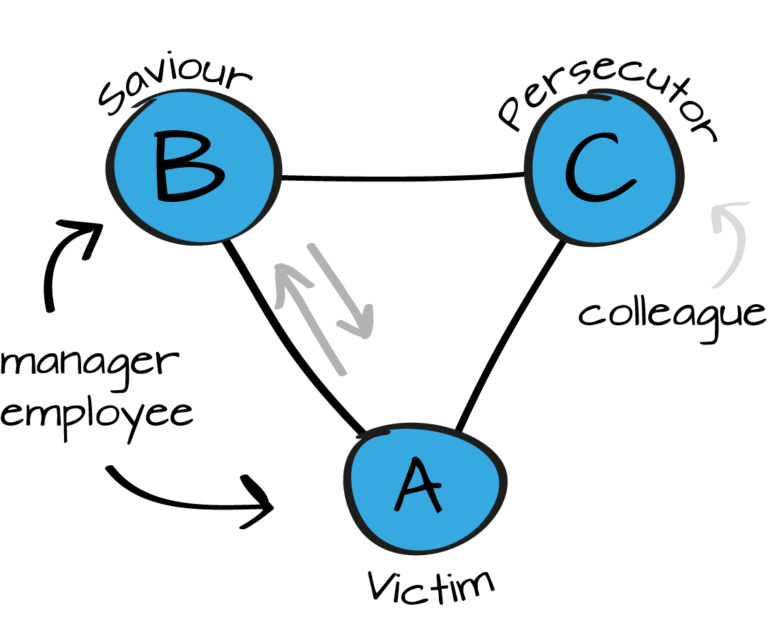
How can a manager help?
Me: „Colleague P isn’t replying to my emails again and the project partners are already asking me when they will receive the reports.“
Colleague M: “Call him. You need to set up the appropriate communication channels / collaboration together.”
Yes, this situation was „played“ in our Open Game office 🙂 Although my colleague Martin is not my manager, he is a „senior“. I came to him playing the Child / Victim – the role that I learned when the glass broke at my grandma’s. Martin gave me the tools – factual information – needed to satisfy my needs. He reacted as an Adult and consciously avoided jumping into the role of the Savior. And by that, he changed something else as well: he disrupted the dynamics between the Child and the Parent and made me enter the Adult ego state.
This is a very significant change: by taking up the role of the Adult, Martin transformed the originally destructive Saviour-Persecutor-Victim triangle into a constructive one, thus changing the roles to Guide-Challenge-Leader. In this triangle, the Persecutor is replaced by a Challenge which can be solved with the help of a Guide (and not a Saviour), so there is no Victim any more – you become your own (Personal) Leader.
This transformation didn’t lead to a miraculous change in the relationship between my colleague and I for a while. The situation with P repeated several times afterwards. The difference was that we both learned from our previous experience and gradually set the appropriate communication channels, defined work priorities and talked openly about my frustration and his exhaustion.
Interrupting my game helped me solve not only this conflict, but a lot more. By repeating similar situations, I can now recognize that this is a game and thanks to this, I can actively shift to the Adult ego state in communication – and to the role of the Guide in my work as a trainer.
Being a leader can take many forms. It does not necessarily mean being a manager or a senior colleague. Definitions of leadership vary from one theory to another. In our office, Martin was a leader for me and I became my own Personal Leader – the Hero of my situation and my story.
Reflexion for Community Organisers
How can we „raise“ new leaders in our communities without taking the role of the „Parent“?
What can we do when organising a community around problems – needs – trauma?
Wheat roles are we taking in our community organising?
by Juraj Víg

